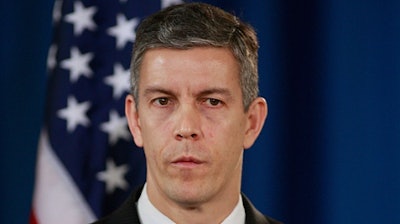 Education Secretary Arne Duncan will meet with HBCU leaders today regarding federal cuts.
Education Secretary Arne Duncan will meet with HBCU leaders today regarding federal cuts.Education Secretary Arne Duncan, who anticipates several days of tough sledding with leaders of the nation’s historically Black colleges, said Wednesday the imminent cuts in federal spending mandated by Congress pose a “bigger issue” for the nation’s education system than for Historically Black Colleges and Universities alone.
“These are tough times, tough times,” Duncan said during a brief session with reporters ahead of the annual National Historically Black Colleges and Universities Week Conference, which starts today in Washington, D.C. The conference is organized by the White House Initiative on HBCUs.
“There’s nothing I can do to mitigate the impact of sequestration,” Duncan continued, referring to the across-the-board 5-percent cut in federal spending that starts next week for the government’s new fiscal year. As a result of sequestration, HBCUs will lose millions in hoped-for federal funds.
“It’s a bigger issue than HBCUs,” Duncan said. “Is education something, in tough times, we can throw away?” he asked, expressing frustration with how the nation’s overall education needs are being addressed by Congress.
Duncan echoed President Obama in citing efforts by less developed nations to strengthen their education systems, adding that “those countries are not managing their economies through sequestration. [Here,] you have a Congress that is very [out of] touch and that creates real pain.”
Duncan is scheduled to speak with HBCU leaders today. In an attempt to lower their expectations prior to the meeting, Duncan acknowledged that HBCUs face particular challenges, including a continued decline in enrollment and income from the revised criteria for his agency’s popular Parent PLUS Loan program.
Duncan admitted his agency had done a poor job of communicating PPL program changes. The changes were not vetted at high levels of the Department of Education nor among presidents of the nation’s colleges and universities, despite the serious possibility that institutions would not get millions in anticipated federal income through parental loans. Tens of thousands of students’ parents were subsequently denied loans in 2012 and again this year, including thousands with children approved for enrollment in HBCUs.
Duncan and aides with him detailed a series of steps the agency has taken to help people that have been denied PPL assistance find alternative sources of funds. He gave no indication the new loan rules would be recalled or held in abeyance, despite calls from college presidents and HBCU advancement groups. As the agency explores a solution, denied loan applicants are being invited to appeal those decisions with assurances that appeals will result in loan approval.
Prior to Duncan, Dr. George Cooper, former president of South Carolina State University, made his debut press appearance as President Obama’s new executive director of the White House Initiative on Historically Black Colleges and Universities.
Cooper, whose career includes 17 years at the U. S. Department of Agriculture, noted the financial challenges facing HBCUs across the country and said White House officials assured him he would have their ear and would listen to his advice.
“I think the president wants me as a peer,” said Cooper, the first permanent executive director of the office in more than a year.
Cooper said he would focus his efforts on trying to “maximize” partnerships among HBCUs “to help during the tough times” ahead. He wants to pursue “strategies to be more involved in federal programs.”
In that regard, Cooper said his office has already begun to explore “discretionary resources” as possible vehicles to bridge some of the falloff in federal income for institutions.
Cooper said he “liked” an idea that HBCU leaders have been suggesting for years that the president endorse a goal of HBCUs being awarded 5 percent of federal spending annually. However, he stopped short of saying he would actively promote adoption of the idea.
Noting his agency had not done enough of its basic homework in some areas, Cooper said his office is working on getting its annual HBCU reports issued soon. Reports for 2008, 2009 and 2010 were never issued. “They will be published,” Cooper said.
More than 500 leaders from HBCUs across the country are expected to participate in this week’s conference, billed “HBCUs Facing Forward, A New Paradigm for Educating the 21st Century Student.”















